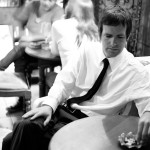
As if being friends with Banksky, running an underground record label (Invada), and producing/playing in Portishead isn’t exciting enough, Geoff Barrow has also spent the past year sharpening the sonic teeth of his new band BEAK>. Rounding out by Robert Plant’s recent bassist (Billy Fuller, also of Invada’s first-ever signing, Fuzz Against Junk) and Matt Williams (Team Brick), the power trio formed in early 2009 and tracked their self-titled debut at their first rehearsals. Slapdash start aside, the songs are the sound of three Bristol vets who are on some sort of spiritual plane together–right alongside everything from the classic Kraut-rock of Can to stoner-metal standards like Sunn O))) and Sleep.
It’s music you lose your mind to, in other words–an even weirder version of Barrow’s creative vision than the last Portishead record, if you can believe that. In the following interview, Barrow discusses everything from his favorite Madlib record to why the Horrors didn’t really need his help after all. BEAK> will be making a couple rare East Coast appearances this weekend, including a stop at Bowery Ballroom on Friday and a set at the upstate edition of All Tomorrow’s Parties on Saturday.
“There’s kids that like songs, and then there’s movers and groovers who look at it all as dinner party music”
How did your first gig go at ATP last year?
It was amazing. Really good, yeah. Hardcore British music fans aren’t the most supportive people sometimes. They’ll all go, ‘Yeah, it’s just this bloke from that other band. And he’s put together this project. Look at how alternative it is.’
Like this is just your art project?
Yeah. More like, ‘Fuck you. Don’t try this shit with us.’ But in the end, the venue filled up, and people seemed to enjoy us.
Do people back home view your label as a vanity project?
No, our first release was a 7-inch from Gonga, and at the time, everything was like Pro Tooled hyper-rock. So this was the opposite–proper long-haired hippie/stoner music. Doom, really. And people liked that–they liked that it was a proper rock record. We’ve been lucky with what we’ve signed, although some of it hasn’t sold anything.
What’s been the biggest-selling release on the label?
Crippled Black Phoenix. We haven’t broken the 10-12,000 copy barrier yet, but I don’t know too many other non-trendy labels that have either.
Right. So how far back do you, Matt and Billy go?
Me and Bill go back to when I released his [self-titled Fuzz Against Junk] record. I met Bill at one of his shows. I got a call from the guy who plays keyboards in Portishead. He was playing with Robert Plant at the time and said they were looking for a bass player. When I finished the call, I walked up the stairs and there was Billy, playing a fuzz-tremolo bass with lots of echo. Just a really heavy sound. So I got back on the phone and told [the keyboardist] how this guy’s killing it. Billy got the job and ended up playing with Robert Plant for two years or something…Matt’s got a reputation as an interesting character musically, too.
BEAK> started at an Invada Christmas party. Every year we play this “Invada Acid Test,” which is a jam between different people on the label. Billy played bass, I played a bit of drums, and Matt was playing clarinet. It went well, so we said we should do it again sometime. Literally a year later, we ended up in a studio and saying, “All right, let’s make some music.”
You were a little vague about Matt being an “interesting character.” In what way do you mean that?
He’s not a traditional musician, or like anyone else I’ve worked with. He’s got avant-garde eyes, really–just brilliant and inspiring. He’s more of a free spirit when we’re locked down, you know?
What were your first rehearsals like then?
Well, they weren’t rehearsals. We jumped right into the recording. The first track on the album is literally us in the studio, once the mics were turned on.
All right then. The record wasn’t recorded in one take though, right? It took about a month?
Yeah. It was all improvised live with no overdubs. We played some of the songs 10 times, but we often went back to the first [take]. We worked out arrangements as we went along, and then edited it because we didn’t want it to be too sprawling. We liked the idea of song structures, you know what I mean? Sometimes it works, and sometimes it’s just boring.
As for the vocals, we all had mics in the room, but I took on that responsibility a bit. I don’t know why. The other guys are better singers than me. Maybe it’s just because I kept coming up with a lot of melodies. But yeah, [the recording] was very straightforward. We didn’t talk about it a lot, we didn’t drink much, we started at 12 and finished at 6. We also ate a lot of tinned fish, like tinned mackerel. Brain food, you know? We had a laugh, really, and got to know each other. I didn’t really produce it. I did like one mix of the second track on the record (“Pill”), but that’s about it.
And you didn’t have any reference points in mind before you went into the studio?
No, the only band we brought in there was the Plastic People of the Universe, a band from the Czech Republic. They got put in jail for making music when the Czech Republic was Communist-run. If you heard them, you’d think they’re rougher than BEAK>, sound wise–really rough, actually, but brilliant.
We’ve all got a massive love for Can too, of course.
That’s the one obvious reference point you keep getting, right? The Kraut-rock influence?
I suppose it is, but what it really comes down to is removing the blues aspect of a jam band.
A little less wankery then?
Yeah. And that usually ends up being kinda Kraut-y. The last Portishead stuff was the same way–we weren’t interested in playing our version of the blues, whereas some of the early stuff was blues or jazz-influenced.
That’s why some people have gotten into BEAK> and the last Portishead record: because they both feel a bit left-field. Not just “cinematic,” which is what I’m sure you heard over and over again during Portishead’s first run.
Well, there’s levels of what you hear about your music. There’s kids that like songs, and then there’s movers and groovers who look at it all as dinner party music. We’ve also had a good, ongoing relationship with hip-hop music.
You mentioned putting out a doom band earlier. Some of BEAK>’s stuff–the bass sound at least–actually reminds me of Om a bit. Are you familiar with them?
Yeah, I love that record Conference of the Birds. We’re all influenced by that, and bands like Sunn O))), Electric Wizard, and Sleep. The Portishead record was a bit, too, although you may not hear that right way.
Right, it’s more that vibe than anything else. Is there anything else you guys are into that most people wouldn’t pick up from listening to the album?
I’m trying to think…Yeah, post-punk like PiL and Joy Division, and British industrial music.
Since the songs were all done on-the-fly, did you ave any breakthrough moments in the studio?
We were into all of it, really, although “I Know” was interesting because it was a really groovy tune, but not. That’s quite nice. We only did two versions of that. Most of the songs were like that–just two or three versions. The first track and “Battery Point” were one take. We’ve all played on really overdub-y records, but we felt like this wasn’t about that. We had enough of a sound between the three of us that we didn’t need to mess around with it.
Were your lyrics pretty free associative too, then?
They were, yeah. I never wrote anything down. And what you hear is what happened in the room. Non-traditional vocals, really. I’m not a very lyrical person, and I’m definitely not a singer. I felt a little weird about it.
“Alternative radio over here is all about Florence and the Karaoke Machine…It’s a hard place to get support”
Fair enough. I’ve gotta ask you about another record now–the Horrors one you co-produced last year (Primary Colours). In a lot of ways, BEAK> sounds like artier versions of those songs. How did all of that happen?
I liked what those guys did with “Sheena Is a Parasite” and Chris Cunningham. Their press person [in the UK] is my wife’s best friend, and she was always saying how ‘into music’ those guys are–that despite them being on the cover of NME with their big hair, they’re really into weird music. So we had them play ATP, and they were really knowledgeable guys. They even made me a compilation.
What was on the compilation?
A lot of odd stuff. I think they called it “God Saves the Queen.” There was a bit of hip-hop, a bit of psychedelic rock…[Keyboardist] Tom [Cowan] has actually made some hip-hop tracks, and they’re wicked.
Anyway, when I came back from touring [with Portishead], they said they’d really like me to produce their record. I was absolutely exhausted at the time, so I probably shouldn’t have done it. The tunes were already written [before I got involved], really. I mean, they were rough, and they had already done two tracks with Chris Cunningham. So they came to the studio and I brought in Craig Silvey, a good friend of mine who’s a great producer himself. That was it, pretty much. I think they thought I was going to work some magic, but there was no need to. What they had done was already brilliant, so I told them to trust their own judgment.
Well, it must have taken them a while to get comfortable with such a drastic change in their sound.
Yeah, but it was all their work. We just helped them along a bit. I think it’s an important British record, actually. The media doesn’t get behind them at all, especially over here. They just won’t play it on the radio because they think it’s too weird. Alternative radio over here is all about Florence and the Karaoke Machine. When people talk about indie music, they’re talking about that. There’s absolutely no love. It’s a hard place to get support.
That said, people seem to be referencing Kraut-rock a lot more these days than they have in years…
Well, how many times can you be punched in the face by a certain sound? Everything’s just so loud, brash and vulgar. So people are drawn to something else. And if it’s out of tune or poorly record, at least it’s honest. I’m not talking about BEAK>. I’m just talking about those records–bands like Neu!.
Tell me a little bit about Malachai, another band you worked with in the past couple years…People don’t seem to ‘get them’ over here.
They’re two guys I’ve known for years in Bristol. They were signed to Universal for a while, but the people over there were going to ruin the record like [major labels] often do.
They probably thought they could pitch it as a ‘Beck record’.
I don’t know, but it’s not what eventually came out. The final release is what they originally worked on. It went from being made on Kaos pads, samplers and rubbish keyboards to massive Pro Tools rigs for a ‘proper record’. And then back again to the simpler setup before we release it on Invada. It’s really tough when you’re signed to a major and they’re holding the purse strings.
Are you going to continue working with them?
I don’t know. We’re mates. We grab a drink here and there.
What do you think of Bristol’s scene right now? Are you into dubstep at all?
I’ve heard a couple tracks by Joker, and they’re really good. They remind me of Bristol right away–a continuation of the dub music that was made here by Adrian Sherwood and artists like that.
You assisted with Massive Attack’s Blue Lines album back in the day, didn’t you?
I didn’t, actually. I delivered sandwiches.
How did you get through the door then, beyond the sandwiches gig?
They liked the beats that I was doing, so they signed me up to their licensing company.
Do you still work on hip-hop stuff now?
There’s a hip-hop album that has 30 MCs on it.
A proper mid-’90s hip-hop record then?
Yeah. We’ve got Guilty Simpson, Bootie Brown (of the Pharcyde), just loads of underground people, a proper old-school posse. Dudes rapping about cash doesn’t really interest us.
When you produce hip-hop now, what sound are you going for?
As rough as I can get it, really. Madlib’s always been a major influence, although he’s a little better than me obviously. [Laughs]
What’s your favorite Madlib record?
Jaylib, the one he did with J Dilla.
Did you even like his rapping on that? A lot of people didn’t.
Well, he was Quasimoto. If you don’t like it, don’t buy it. [Laughs]
Speaking of, will the next BEAK> record be a little more scripted you think?
Definitely not. The next one will be even more of a non-‘proper’ record.



